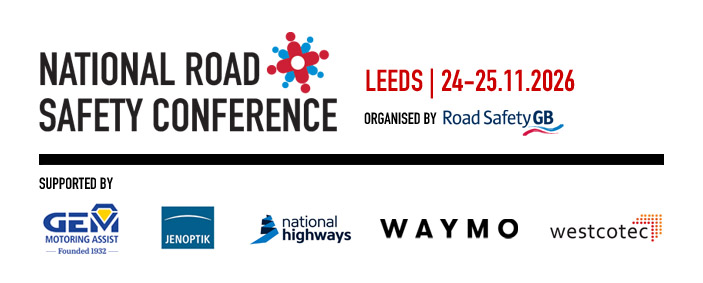Workshop: Things that didn’t work!
Delegates must book in advance to attend this workshop, which is now fully subscribed - no further availability.
This Fringe workshop has the potential to be very beneficial to the road safety sector. We all need to share results, whether or not the project or intervention was successful. We need to learn from each other, perhaps especially about what doesn’t work. There really isn’t enough of this going on in road safety (and many other fields).
This session will comprise a series of presentations covering schemes where there was an evaluation or assessment, and the results were not as expected.
Attendees will also be encouraged to contribute to the session by discussing their experiences of interventions that did not turn out as anticipated.
This ‘amnesty’ on unsuccessful projects is intended to help people learn lessons from one another as it is a common failure across behaviour change that we tend only to share positive results.
If we are to improve the quality of projects delivered, we need to be ready to embrace the fact that things don’t always work.
 Facilitated by Tanya Fosdick
Facilitated by Tanya Fosdick
Head of Research, Agilysis
Tanya is an experienced researcher who specialises in translating complex evidence into practice. With more than a decade of experience in the road safety sector, especially in relation to young drivers and motorcyclists, Tanya seeks to bridge the gap between academia and practitioners to improve the quality of road safety interventions, particularly in the educational arena.
Tanya is head of research at Agilysis and principal research associate at Road Safety Analysis, leading research for both organisations and collaborating with the internal teams and often a variety of external experts to deliver projects.
Tanya's recent work includes exploring the issues relating to rural young drivers, adult pedestrians, occupational road risk, older drivers, the road safety performance of the Coalition Government and assessing the British Road Safety Statement.
In addition to research, Tanya has been leading evaluation projects since 2003, incorporating behaviour change theories into evaluation methodologies. She is currently involved in a variety of local and national evaluation projects exploring the efficacy of young driver, advanced driver training and motorcycle interventions.
Confirmed speakers in this session (09/11/18)
 Dr Shaun Helman
Dr Shaun Helman
Head of Transport Psychology, TRL
Dr Shaun Helman is the head of transport psychology at the Transport Research Laboratory. Shaun is a cognitive psychologist who has been involved in researching road safety and driver behaviour for the last 18 years. He is particularly interested in the links between driver behaviour and safety outcomes such as collisions and injuries, and in high risk groups such as young and novice drivers, those driving for work, and motorcyclists.
Project: Learning to Drive – Evaluating a client-centred approach to learning to drive.
Between 2011 and 2013, TRL evaluated a new learning to drive syllabus and process for the then Driving Standards Agency. The new approach, based on ‘coaching’ and ‘client centred’ techniques, was evaluated against its impact on a range of safety-related factors. It was concluded that the new approach had little if any impact on learners, and what impact it did have had benefits and dis-benefits for safety. This presentation will outline the value that nonetheless arose from this project, both in terms of saving public money and advancing our understanding of young and newly-qualified driver psychology and skills.

Deirdre O’Reilly
Head of Social Research and Behaviour Change, Safety Group, Highways England
Deirdre O’Reilly joined Highways England to lead a team to deliver social research and behavioural change with a particular focus on road safety.
She is the former head of social and behavioural research at the Department for Transport and has more than 20 years’ experience of delivering road safety and transport research and evidence to inform policy and practise in central government.
Learning lessons
To minimize our natural tendencies towards only reporting successful outcomes we need to actively ask what worked and what didn’t work, for whom, in what context and, where possible, why. We need evidence based insights to improve road safety. Embracing and sharing positive and negative results develops stronger insights and better understanding, and enables professionals to make better decisions. By testing and piloting of potential measures we can drive progress and innovation and as such we don’t expect everything to be successful. Using examples from road safety and beyond Deirdre will demonstrate the value of negative results of tests and pilots including counter intuitive findings. Testing, ‘failing fast’ & ‘failing better’ are an essential part of the process of developing effective measures to improve road safety.
 Dr Helen Keyes
Dr Helen Keyes
Principal Lecturer in Psychology, Anglia Ruskin University
Dr Helen Keyes teaches and researches in the area of visual perception. She uses experimental methods in her work, including psychophysics and EEG paradigms. A particular focus of Helen's research is on ways to improve drivers' perceptions of, and reaction to, road scene events.
Look-But-Fail-To-See errors
Look-But-Fail-To-See errors, where the driver of a car turning onto a road reports that they looked in the direction of an approaching motorcycle but failed to notice it, are a common factor in motorcycle accidents. This study looked at whether simple training – searching for motorcycles in images of car parks – could increase the cognitive conspicuity of motorcycles in a lab-based road junction task.
The study replicated Crundall, Humphrey and Clarke’s (2008) finding that motorcycles are noticed less than cars at further distances, but found that the training intervention had no effect. This suggests that the decrease in conspicuity suffered by motorcycles when viewed at a far distance is a visual – rather than cognitive – effect, with motorcycles simply being harder to see because they are smaller than cars. In this case, focusing on increasing motorcyclist visibility may be the most effective way to improve driver responses to motorcycles at junctions.
 Paul Copeland
Paul Copeland
Road Safety Manager, East Riding of Yorkshire Council
Paul has spent the past 28 years dealing with highway design, traffic management, collision analysis, road safety engineering, behaviour change and enforcement work, sustainable travel and emergency planning. Working locally, regionally and nationally, Paul and his award winning team have delivered casualty reduction and sustainable travel schemes using a range of measures from hard engineering through to gentle persuasion.
Being a member of the CIHT Road Safety Road Safety Panel and current chair of the ADEPT Traffic & Safety Group as well as part of the Yorkshire & Humber Road Safety GB group, Paul works to link activities between organisations. He is also a member of the DfT Standing Committee on Road Accident Statistics trying to ensure that the data collected following a collision is both coherent and useful.
Piloting rural 40mph zones
East Riding of Yorkshire Council piloted rural 40mph zones on a number of routes from 2011. Analysis of the performance of the schemes highlights what can be achieved with the zones, what we knew beforehand, what we found out afterward and what we wish we'd thought of before we began.
 Steve Barber MIRSO
Steve Barber MIRSO
Road Safety and Travel Choices, Northamptonshire Highways
After starting his working life at the age of 16 as a police cadet, Steve went on to serve for 27 years in Leicestershire Constabulary, always in uniform and never far from highways incidents.
Upon retirement he developed an interest in road safety with Leicestershire County Council, teaching in primary schools on a part time basis.
This interest developed into a full time post in the Highways-Road Safety Department at Northamptonshire County Council, initially reworking the Cycling Proficiency Programme, and then drawing on old skills to move into collision investigation and analysis as well as starting Northamptonshire’s parish self purchase VAS scheme.
He proposed the initial business plan for Northamptonshire’s Cycle Connect and ‘Too Fast – Too Soon’ programmes, ‘just to prove that coal face workers can also come up with ideas’.
In 2008, his crash investigation role led him into the ‘First Go’ scheme, and its subsequent problems which he will share with delegates today.
Register to attend
Delegates must book in advance to attend this workshop, which is now fully subscribed - no further availability.
